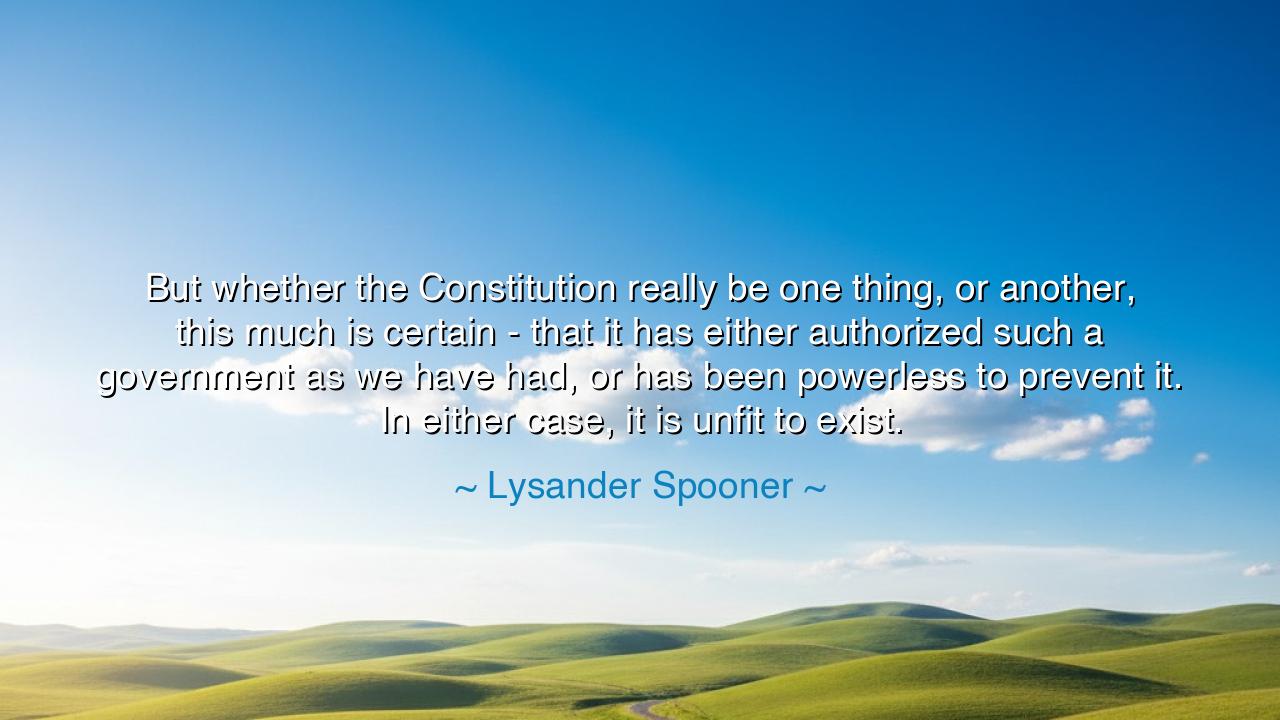
But whether the Constitution really be one thing, or another
But whether the Constitution really be one thing, or another, this much is certain - that it has either authorized such a government as we have had, or has been powerless to prevent it. In either case, it is unfit to exist.






"But whether the Constitution really be one thing, or another, this much is certain — that it has either authorized such a government as we have had, or has been powerless to prevent it. In either case, it is unfit to exist." — Lysander Spooner
Hear these words, O seekers of truth, and tremble at their daring, for few in any age have spoken so boldly against the idols of men. Lysander Spooner, philosopher, lawyer, and rebel of conscience, was a man who bowed to no false authority. When he declared, “But whether the Constitution really be one thing, or another… it is unfit to exist,” he was not uttering treason against his nation, but judgment against hypocrisy. His words were not the cry of an anarchist without reason, but the lament of a free mind betrayed by the very instrument that promised liberty. He gazed upon the government of his day — bloated with power, corrupt in spirit, indifferent to justice — and found the sacred parchment wanting.
The meaning of Spooner’s words is sharp and unflinching: a constitution that either permits tyranny or fails to prevent it is no true shield of liberty. For what is a law that cannot restrain evil? What is a covenant that protects the oppressor as much as the oppressed? Spooner speaks to the heart of political morality — that written words, however noble, are worthless if they give rise to systems that crush the individual and sanctify injustice. He calls us to measure not the beauty of a document, but the fruit it bears. If the tree of government yields corruption, oppression, and servitude, then its roots — the constitution itself — are diseased.
The origin of this fiery declaration lies in Spooner’s struggle against slavery and the civil power that upheld it. Born in the early nineteenth century, he was a man who believed in the absolute sovereignty of the individual — that no person has rightful authority over another without consent. When he saw the United States Constitution invoked to justify slavery, he wrote a blistering work titled The Unconstitutionality of Slavery, arguing that no just reading of that charter could ever support human bondage. Yet when the nation plunged into civil war, and both North and South trampled liberty underfoot — one in defense of slavery, the other in the name of forced unity — Spooner’s faith in the Constitution itself was shattered. He saw that it had either authorized tyranny or failed to prevent it, and thus, in his eyes, had forfeited its moral legitimacy.
To understand the power of his insight, look to the ancient republics that fell before him. Rome, too, had its constitution — its Senate, its laws, its symbols of freedom. Yet in time, those sacred forms became hollow, their meaning twisted by ambition and fear. When Caesar crossed the Rubicon, the Roman people still possessed their constitution on parchment, but not in practice. Their laws still spoke of liberty, even as they bowed to empire. Spooner saw in his own America a mirror of this decay: a people who worshipped the form of freedom while ignoring its substance, who honored the Constitution as an idol, even as it failed to protect them from the very despotism it was meant to prevent.
But Spooner’s message, though fierce, is not merely destructive — it is awakening. He calls upon men to see that freedom does not live in documents, nor in governments, nor in the words of the dead. It lives in the hearts and actions of the living. The law of justice, he said, exists before and above all written law; and any constitution that violates that sacred law is itself void. “No man can delegate a right he does not possess,” he wrote, meaning that no people can rightfully create a government that grants to a few the power to enslave or exploit the rest. Thus, the true constitution of humanity is not written in ink, but in conscience — and conscience cannot be amended by power.
Yet his words bear a warning that rings through time: beware the seduction of authority that wears the mask of law. The chains that bind the spirit are not always forged in tyranny; sometimes, they are signed and ratified by the people themselves. Governments grow monstrous not only because they are permitted to do evil, but because the governed cease to question the instruments that enable it. Spooner’s wisdom calls each citizen to a higher duty — to test every law against the measure of justice, and to withdraw allegiance from that which violates the soul’s liberty. To obey unjust authority is to nourish it; to resist it is to restore balance to the world.
So, my friends, take this lesson as both sword and shield: do not worship the law — worship justice. Constitutions may crumble, governments may fall, but truth endures. Remember that no document can guarantee freedom to those who refuse to defend it, and no government can enslave a people who know their own worth. Let your loyalty be not to parchment, but to principle; not to power, but to the dignity of man. As Spooner taught, freedom is not granted — it is claimed. And when the instruments of liberty become tools of oppression, it is the sacred duty of the living to cast them aside and begin anew. For the spirit of liberty, like the human soul, must never be confined to the dead words of the past — it must live, and breathe, and rise again in every generation.






AAdministratorAdministrator
Welcome, honored guests. Please leave a comment, we will respond soon